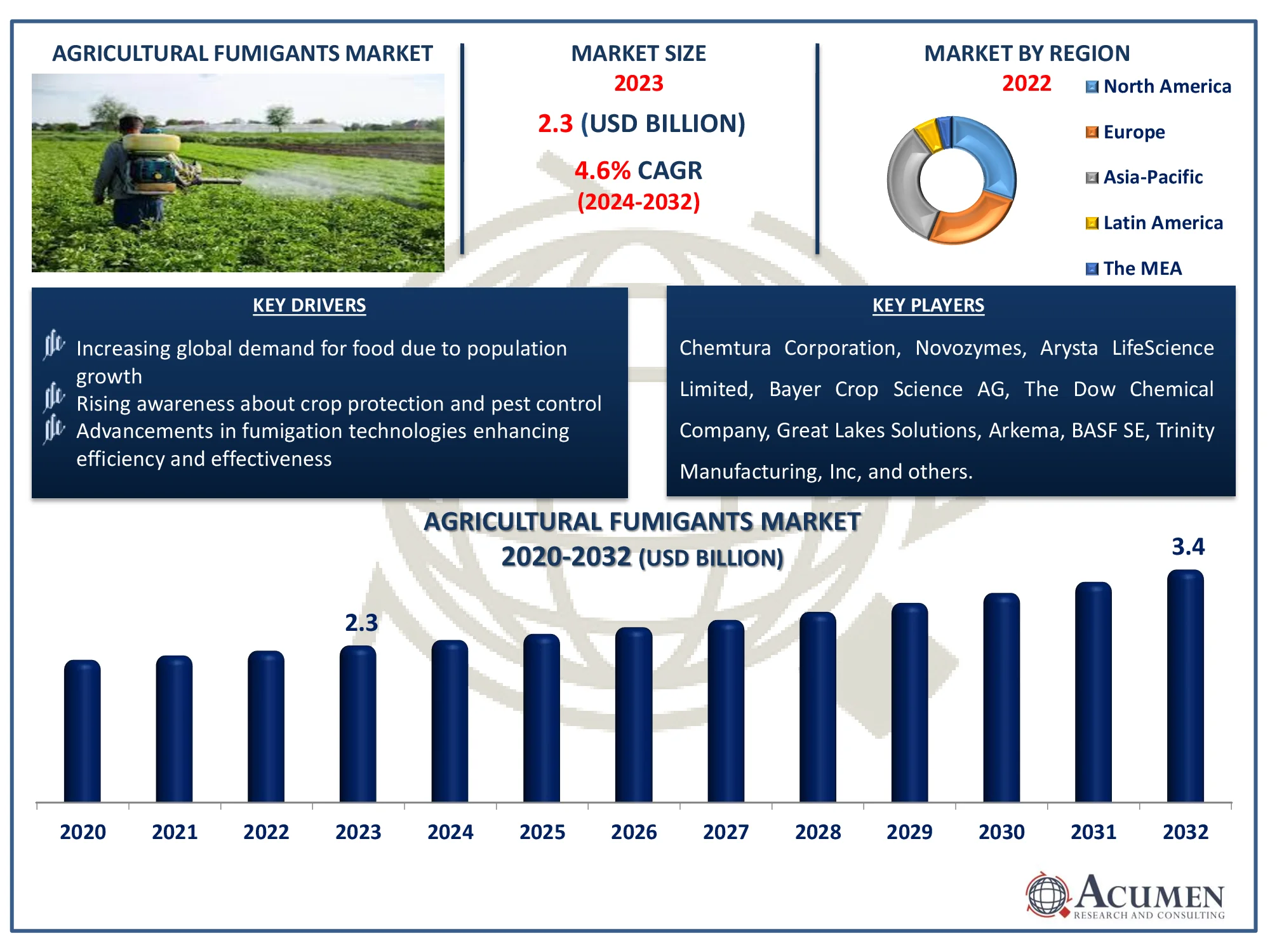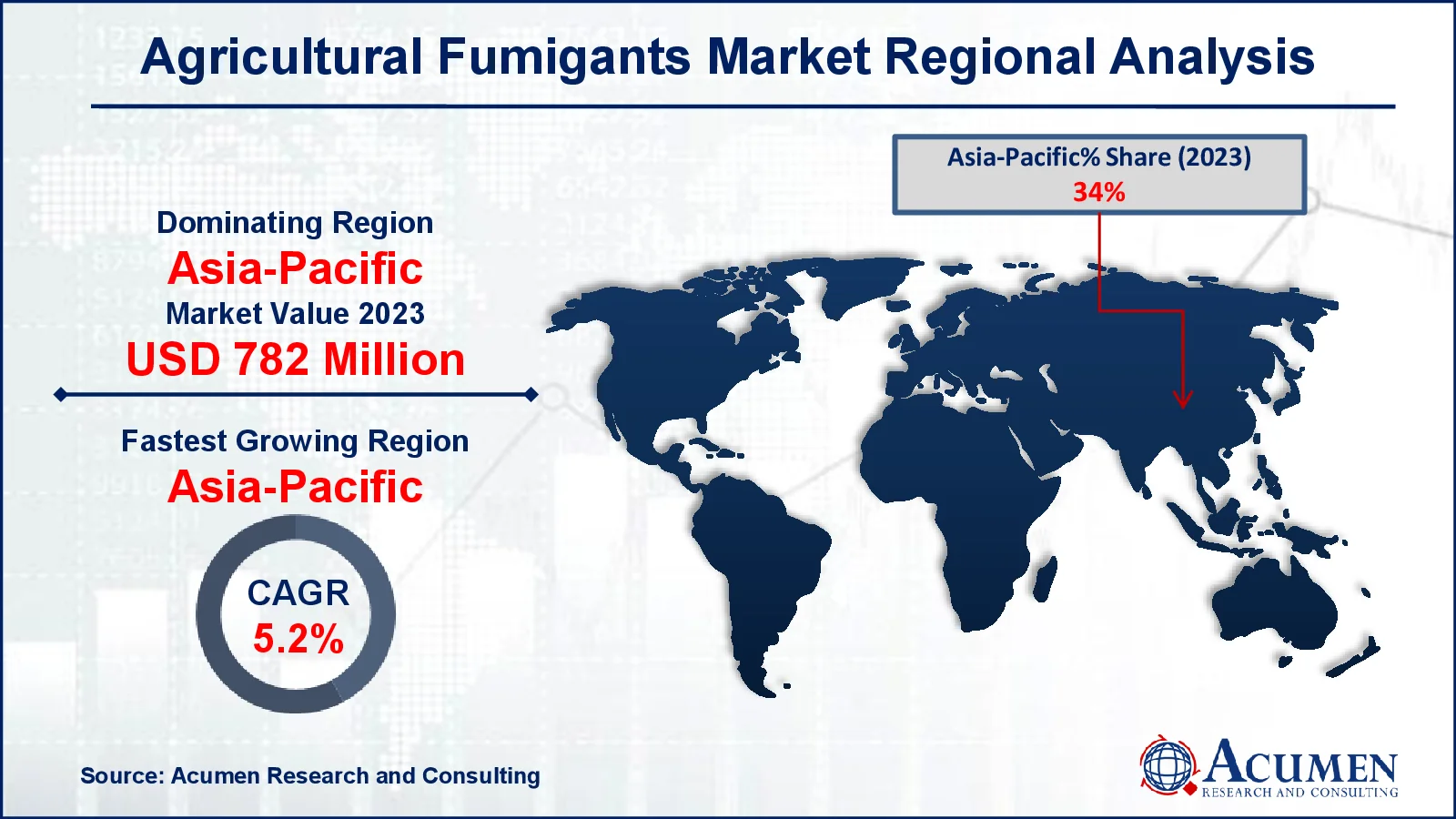Agricultural Fumigants Market | Acumen Research and Consulting
Agricultural Fumigants Market Size - Global Industry, Share, Analysis, Trends and Forecast 2024 - 2032
Published :
Report ID:
Pages :
Format :
The Global Agricultural Fumigants Market Size accounted for USD 2.3 Billion in 2023 and is estimated to achieve a market size of USD 3.4 Billion by 2032 growing at a CAGR of 4.6% from 2024 to 2032
Agricultural Fumigants Market Highlights
- Global agricultural fumigants market revenue is poised to garner USD 3.4 billion by 2032 with a CAGR of 4.6% from 2024 to 2032
- Asia-Pacific agricultural fumigants market value occupied around USD 782 Million in 2023
- Asia-Pacific agricultural fumigants market growth will record a CAGR of more than 5.2% from 2024 to 2032
- Among product, the phosphine sub-segment generated 30% of share in 2023
- Based on crop type, the cereals & grains sub-segment generated 43% of agricultural fumigants market share in 2023
- Emphasis on integrated pest management strategies incorporating fumigants for better crop protection is a popular agricultural fumigants market trend that fuels the industry demand

Agricultural fumigants are chemicals used to eradicate pests and diseases in agriculture. They can be applied to the soil before growing crops or stored to protect grains and fruits after harvest. When employed in the soil, fumigants serve to prevent insect, weed, and other plant-damaging organisms. In storage, they prevent pests and mold from ruining food. Common fumigants include methyl bromide and phosphine. While fumigants are excellent at keeping crops and stored food safe, they should be handled with caution due to potential risks to human health and the environment.
Global Agricultural Fumigants Market Dynamics
Market Drivers
- Increasing global demand for food due to population growth
- Rising awareness about crop protection and pest control
- Advancements in fumigation technologies enhancing efficiency and effectiveness
Market Restraints
- Stringent government regulations on the use of chemical fumigants
- Growing concerns about environmental and health impacts of fumigants
- High cost of fumigants and application equipment
Market Opportunities
- Development of eco-friendly and bio-based fumigants
- Expansion in emerging markets with increasing agricultural activities
- Rising adoption of integrated pest management (IPM) practices
Agricultural Fumigants Market Report Coverage
| Market | Agricultural Fumigants Market |
| Agricultural Fumigants Market Size 2022 |
USD 2.3 Billion |
| Agricultural Fumigants Market Forecast 2032 | USD 3.4 Billion |
| Agricultural Fumigants Market CAGR During 2023 - 2032 | 4.6% |
| Agricultural Fumigants Market Analysis Period | 2020 - 2032 |
| Agricultural Fumigants Market Base Year |
2022 |
| Agricultural Fumigants Market Forecast Data | 2023 - 2032 |
| Segments Covered | By Product, By Form, By Crop Type, By Pest Control Method, By Application, And By Geography |
| Regional Scope | North America, Europe, Asia Pacific, Latin America, and Middle East & Africa |
| Key Companies Profiled | Chemtura Corporation, Novozymes, Arysta LifeScience Limited, Bayer Crop Science AG, The Dow Chemical Company, Great Lakes Solutions, Arkema, BASF SE, Trinity Manufacturing, Inc, AMVAC Chemical Corporation, and Syngenta AG. |
| Report Coverage |
Market Trends, Drivers, Restraints, Competitive Analysis, Player Profiling, Covid-19 Analysis, Regulation Analysis |
Agricultural Fumigants Market Insights
The growing demand for chloropicrin, phosphine, 1, 3-dichloropropene, and metam sodium are the primary driving forces behind market expansion. The growing need for crop protection strategies and harvest practices is fueling market growth. The relevance of these products in reducing post-harvest losses is expected to be a major driver for the horticultural fumigants market. According to a World Health Organization (WHO) estimate, more than 33% of food is wasted or lost as a result of inefficient capacity. Reducing these tragedies may alleviate the strain on the horticultural industry to meet the dietary needs of a growing population. It will also reduce the misuse of other economic normal assets.
Soil fumigation is a pre-plant treatment of soil with pesticides to control crop illnesses caused by nematodes, rodents, weeds, and creepy insects, among other things. All fumigants associated with plants are phytotoxic; therefore, they should be removed from the soil prior to seeding or transplanting to avoid product damage. The application of these items to soil is heavily reliant on a variety of factors, including crop type, soil type and texture, air space, temperature, and dose, among others.
The World Health Organization has approved fumigants, which are classified as bug sprays, for the storage of food grains. The association also conducts annual audits to assess the risk of existing products as well as new items introduced to the market. The post-reap step, which includes capacity and transportation, involves the use of fumigants to reduce storage losses.
Phosphine is the most common substance, and it is widely used in closed warehouses to protect gathered crops from flies and other pests. They may successfully disperse and permeate bulks of stored grains while also performing fumigation movement for more than seven days after application.
Agricultural Fumigants Market Segmentation
The worldwide market for agricultural fumigants is split based on product, form, crop type, pest control method, application, and geography.
Agricultural Fumigant Market By Product
- 1,3 Dichloropropene
- Chloropicrin
- Dimethyl Disulfide
- Methyl Bromide
- Metam Potassium
- Metam Sodium
- Phosphine
- Others
According to agricultural fumigants industry analysis, phosphine is a popular fumigant used by farmers. Phosphine is the most common substance, and it is widely used in closed warehouses to protect gathered crops from flies and other pests. They may successfully disperse and permeate bulks of stored grains while also performing fumigation movement for more than seven days after application.
Agricultural Fumigant Market By Form
- Solid
- Liquid
- Gas
Liquid variant is the most prominent variety and is expected to grow the fastest compared to its partners. This frame is typically injected into the soil, forming a defensive gas layer around the roots to prevent them from deteriorating due to pest infestation. There are several restrictions in place to prevent gaseous fluctuations from causing harm to human health while also endangering the environment.
Agricultural Fumigant Market By Crop Type
- Cereals & Grains
- Oilseeds & Pulses
- Fruits & Vegetables
- Other Crop Types
In the agricultural fumigants market, fruits and vegetables are anticipated to be a most popular crop types. This is due to its high value and susceptibility to spoilage, necessitating pest and disease prevention. Fumigants contribute to the quality and safety of these crops, particularly for long-term storage and transportation. The requirement to comply with tight standards when exporting fruits and vegetables also boosts the use of fumigants. As a result, fruits and vegetables anticipated to dominate this industry due to their high demand for pest control.
Agricultural Fumigant Market By Pest Control Method
- Tarpaulin Fumigation
- Non-Trap Fumigation By Injection
- Structural Fumigation
- Vacuum Chamber Fumigation
- Others
historically, tarpaulin fumigation is expected to be most popular method in the agricultural fumigants market because it's effective and versatile. It involves covering crops or soil with a tarp and releasing fumigants underneath, which kills pests at all stages. This method works well for both pre-harvest and post-harvest pest control, making it useful for a variety of agricultural products. It's also cost-effective and easy to use, requiring minimal equipment.
Agricultural Fumigant Market By Application
- Soil
- Warehouses
- Others
According to agricultural fumigants industry forecast, warehouses are projected to dominate market since they keep vast amounts of produce that can attract pests. Using fumigants helps to prevent these products from damage and deterioration. As global trade develops, more warehouses require effective pest management to protect their cargo. Strict food safety regulations also require warehouses to use fumigants to assure high-quality products. With increased awareness, warehouses are spending more in these solutions.
Agricultural Fumigants Market Regional Outlook
North America
- U.S.
- Canada
Europe
- U.K.
- Germany
- France
- Spain
- Rest of Europe
Asia-Pacific
- India
- Japan
- China
- Australia
- South Korea
- Rest of Asia-Pacific
Latin America
- Brazil
- Mexico
- Rest of Latin America
The Middle East & Africa
- South Africa
- GCC Countries
- Rest of the Middle East & Africa (ME&A)

Agricultural Fumigants Market Regional Analysis
According to regional analysis of agricultural fumigants market and in terms of volume utilization and consumption, Asia-Pacific dominates, and fastest-growing region in market, accounting for 5.2% in 2023. The region is home to several crop protection chemical manufacturers, and the need for sustainable agriculture is increasing on a regular basis. In addition, the region is strictly regulated by several standards to ensure safe cultivation. To maintain product manageability and maximum output, manufacturers are required to follow specified rules.
Europe shows notable growth in industry. It’s a major pesticide consumer and partner due to its growing agriculture industry, which is aided by easy access and favorable weather conditions, resulting in the massive production of a wide range of products. Alternatively, many authorities are implementing controls in response to the excessive use of soil protection pesticides in the area. As a result, organic farming practices are now being used throughout Europe.
Agricultural Fumigants Market Players
Some of the top agricultural fumigants companies offered in our report include Chemtura Corporation, Novozymes, Arysta LifeScience Limited, Bayer Crop Science AG, The Dow Chemical Company, Great Lakes Solutions, Arkema, BASF SE, Trinity Manufacturing, Inc, AMVAC Chemical Corporation, and Syngenta AG.
Frequently Asked Questions
How big is the agricultural fumigants market?
The agricultural fumigants market size was valued at USD 2.3 billion in 2023.
What is the CAGR of the global agricultural fumigants market from 2024 to 2032?
The CAGR of agricultural fumigants is 4.6% during the analysis period of 2024 to 2032.
Which are the key players in the agricultural fumigants market?
The key players operating in the global market are including Chemtura Corporation, Novozymes, Arysta LifeScience Limited, Bayer Crop Science AG, The Dow Chemical Company, Great Lakes Solutions, Arkema, BASF SE, Trinity Manufacturing, Inc, AMVAC Chemical Corporation, and Syngenta AG.
Which region dominated the global agricultural fumigants market share?
Asia-Pacific held the dominating position in agricultural fumigants industry during the analysis period of 2024 to 2032.
Which region registered fastest CAGR from 2024 to 2032?
Asia-Pacific region exhibited fastest growing CAGR for market of agricultural fumigants during the analysis period of 2024 to 2032.
What are the current trends and dynamics in the global agricultural fumigants industry?
The current trends and dynamics in the agricultural fumigants industry include increasing global demand for food due to population growth, rising awareness about crop protection and pest control, and advancements in fumigation technologies enhancing efficiency and effectiveness.
Which product held the maximum share in 2023?
The phosphine held the maximum share of the agricultural fumigants industry. 



